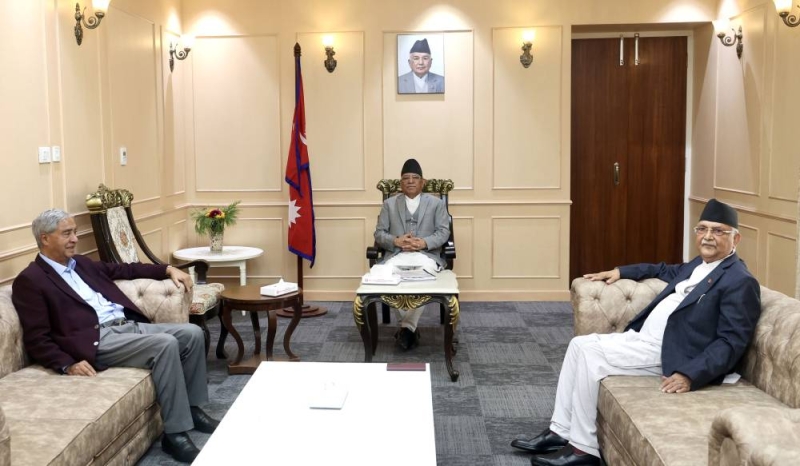
Seven months down the line, political stability appears to have prevailed, but what is the stability for when the country appears to be a permanent patient in the ICU? The Nepali Congress (NC) and the Unified Marxist-Leninist (UML) coalition had evoked a mixed response when it was formed in deep midnight last July. Those who were fed up with the spate of political instability heaved a great sigh of relief. They thought that the coalition would heal the political wound bleeding the country.
There was, however, no dearth of critics who maintained that the tying of the political knot between the two largest parties in the parliament was just not in consonance with the spirit of parliamentary democracy and was doomed to failure. Some even opined that this was designed to prevent the landing of the parties' supremo behind bars as the government then had made preparations to hold them responsible for corrupt acts, such as the Wide Body and Giribandhu Tea Estate scams. As things stand now, the so-called arm chair critics do not seem to be too wide off the mark.

It may be remembered that the coalition duo had made a pledge to provide the much-needed political stability in the country. They further said that they would pull off some kind of a miracle by amending the constitution, stopping the flight of youths to foreign lands, increase the spending of the development budget and reverse the trajectory of the sagging economy of the country. Seven months down the line, the promises seem to be at best like unattended guests.
Political stability appears to have prevailed, but what is the stability for when the country appears to be a permanent patient in the Intensive Care Unit? When the constitution amendment should have made sufficient headway by now, it appears to have just made a start going by the recent meeting of the high-level political machinery. The decrease in the flight of youths and the improvement of the economy are not visible despite the claim of the government. The economy is at the receiving end of the lusty blow dealt by the suspension of U.
S. aid worth billions. The return of some 1,365 illegal Nepali migrants back to the country is certain to create deep political ripples.
The government does not seem to be have any strategy to combat such spasmodic attacks. The coalition seems to be such a disunited lot that they appear as estranged and uneasy bed fellows probably because of the diagonally opposite ideology. This can be gauged by the tabling of the six bills by a coalition that boasts of a near two-thirds majority in the Parliament, the fate of one of which is just hanging in the balance that too due to lack of support of not the opposition but one of the partners of the coalition.
The Samajbadi Party supremo appears to have handed the tit for tat in view of the division of his party allegedly masterminded by one of the present coalition partners. The NC also created a surprise when a person no less than one of its general secretaries said that it was unaware of some of these bills. The government has been drained off morally so much so that the Prime Minister has lacked the teeth to answer the questions raised by the opposition members in the Parliament.
The government cannot make excuses because there are many examples whereworld political leaders pulled the country virtually from the jaws of failure in 1990 when they were in a worse situation than Nepal at the present juncture. One example is that of our southern neighbour, India, when Chandra Sekhar was the Prime Minister. He did not have the luxury of exercising a near two-thirds majority as the present Prime Minister of Nepal, KP Oli.
Instead, he headed a minority government of the breakaway faction of the Janata Dal with outside support from the Indian National Congress headed by Rajiv Gandhi. Consequently, Chandra Sekhar could not pass his own budget following which the Moodys, one of the then top three credit rating agencies, downgraded India at a time when it lacked foreign reserves to sustain even two weeks' import. Due to this, India could not get any short-term loans from agencies, including the World Bank and the International Monetary Fund.
Chandra Sekhar had to resort to mortgaging gold to avoid the default payment. He prepared a liberalisation proposal of the Indian economy to steer India out of the troubled economic waters with assistance from his economic advisor Man Mohan Singh along with Subramaniyam Swamy, an Oxford professor, and Montek Singh Ahluwalia. Unfortunately, Chandra Sekhar had to resign in 1991, but this liberalisation proposal, also known as Manmohanomics, proved to be a saviour for India, which was continued by Man Mohan Singh as the Finance Minister under Prime Minister Narasimha Rao.
The proposal was to deregulate the economy and drift to capitalism from the rather conservative socialism under practice. It led to the reduction of state control of the economy and import taxes along with the removal of hurdles for receiving Direct Foreign Investment. The situation of Nepal is not as bad as it was of India then.
Thanks to the remittance flowing into the country, Nepal has enough foreign currency to import goods for 14 months. What are the options for Nepal then? The coalition should either perform or perish. Prime Minister Oli should display innovative courage like Chandra Sekhar, failing which he should hand over power to the NC.
It is difficult to expect dramatic improvement from the NC also as they are after all birds of the same feather. The last alternative is then the formation of an all-party government to hold the elections at a time when its sagging economy allows for it. The President should facilitate such a situation by opening dialogue among all the parties from within the constitution.
After all, this proposal provides every party a chance..















